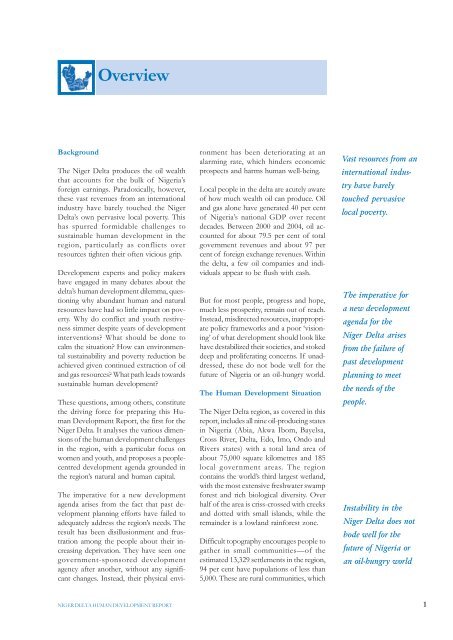Niger Delta Human Development Report - UNDP Nigeria - United ...
Niger Delta Human Development Report - UNDP Nigeria - United ...
Niger Delta Human Development Report - UNDP Nigeria - United ...
You also want an ePaper? Increase the reach of your titles
YUMPU automatically turns print PDFs into web optimized ePapers that Google loves.
Background<br />
Overview<br />
The <strong>Niger</strong> <strong>Delta</strong> produces the oil wealth<br />
that accounts for the bulk of <strong>Niger</strong>ia’s<br />
foreign earnings. Paradoxically, however,<br />
these vast revenues from an international<br />
industry have barely touched the <strong>Niger</strong><br />
<strong>Delta</strong>’s own pervasive local poverty. This<br />
has spurred formidable challenges to<br />
sustainable human development in the<br />
region, particularly as conflicts over<br />
resources tighten their often vicious grip.<br />
<strong>Development</strong> experts and policy makers<br />
have engaged in many debates about the<br />
delta’s human development dilemma, questioning<br />
why abundant human and natural<br />
resources have had so little impact on poverty.<br />
Why do conflict and youth restiveness<br />
simmer despite years of development<br />
interventions? What should be done to<br />
calm the situation? How can environmental<br />
sustainability and poverty reduction be<br />
achieved given continued extraction of oil<br />
and gas resources? What path leads towards<br />
sustainable human development?<br />
These questions, among others, constitute<br />
the driving force for preparing this <strong>Human</strong><br />
<strong>Development</strong> <strong>Report</strong>, the first for the<br />
<strong>Niger</strong> <strong>Delta</strong>. It analyses the various dimensions<br />
of the human development challenges<br />
in the region, with a particular focus on<br />
women and youth, and proposes a peoplecentred<br />
development agenda grounded in<br />
the region’s natural and human capital.<br />
The imperative for a new development<br />
agenda arises from the fact that past development<br />
planning efforts have failed to<br />
adequately address the region’s needs. The<br />
result has been disillusionment and frustration<br />
among the people about their increasing<br />
deprivation. They have seen one<br />
government-sponsored development<br />
agency after another, without any significant<br />
changes. Instead, their physical envi-<br />
ronment has been deteriorating at an<br />
alarming rate, which hinders economic<br />
prospects and harms human well-being.<br />
Local people in the delta are acutely aware<br />
of how much wealth oil can produce. Oil<br />
and gas alone have generated 40 per cent<br />
of <strong>Niger</strong>ia’s national GDP over recent<br />
decades. Between 2000 and 2004, oil accounted<br />
for about 79.5 per cent of total<br />
government revenues and about 97 per<br />
cent of foreign exchange revenues. Within<br />
the delta, a few oil companies and individuals<br />
appear to be flush with cash.<br />
But for most people, progress and hope,<br />
much less prosperity, remain out of reach.<br />
Instead, misdirected resources, inappropriate<br />
policy frameworks and a poor ‘visioning’<br />
of what development should look like<br />
have destabilized their societies, and stoked<br />
deep and proliferating concerns. If unaddressed,<br />
these do not bode well for the<br />
future of <strong>Niger</strong>ia or an oil-hungry world.<br />
The <strong>Human</strong> <strong>Development</strong> Situation<br />
The <strong>Niger</strong> <strong>Delta</strong> region, as covered in this<br />
report, includes all nine oil-producing states<br />
in <strong>Niger</strong>ia (Abia, Akwa Ibom, Bayelsa,<br />
Cross River, <strong>Delta</strong>, Edo, Imo, Ondo and<br />
Rivers states) with a total land area of<br />
about 75,000 square kilometres and 185<br />
local government areas. The region<br />
contains the world’s third largest wetland,<br />
with the most extensive freshwater swamp<br />
forest and rich biological diversity. Over<br />
half of the area is criss-crossed with creeks<br />
and dotted with small islands, while the<br />
remainder is a lowland rainforest zone.<br />
Difficult topography encourages people to<br />
gather in small communities—of the<br />
estimated 13,329 settlements in the region,<br />
94 per cent have populations of less than<br />
5,000. These are rural communities, which<br />
Vast resources from an<br />
international industry<br />
have barely<br />
touched pervasive<br />
local poverty.<br />
The imperative for<br />
a new development<br />
agenda for the<br />
<strong>Niger</strong> <strong>Delta</strong> arises<br />
from the failure of<br />
past development<br />
planning to meet<br />
the needs of the<br />
people.<br />
Instability in the<br />
<strong>Niger</strong> <strong>Delta</strong> does not<br />
bode well for the<br />
future of <strong>Niger</strong>ia or<br />
an oil-hungry world<br />
NIGER DELTA HUMAN DEVELOPMENT REPORT 1










